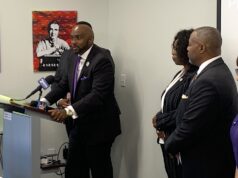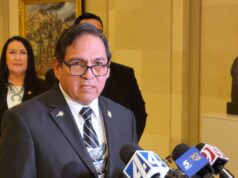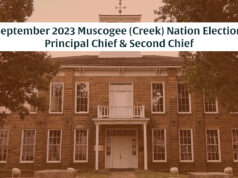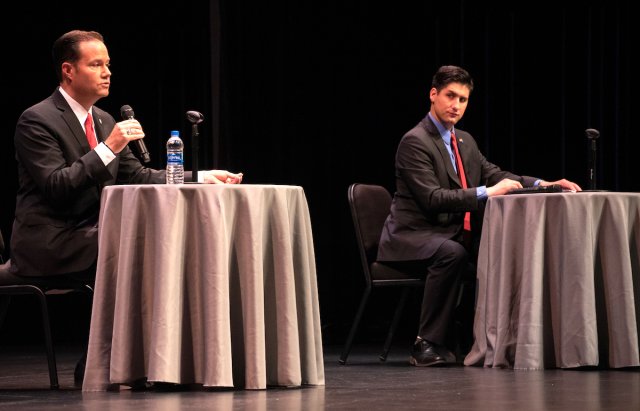

When five Republican candidates for Oklahoma’s 5th Congressional District took the stage Thursday for NonDoc’s Convo at the College debate, none knew the night’s first question would put them on the spot about the Black Lives Matter movement.
In the ensuing five minutes, some seemed to offer support for the movement’s ultimate goal of reducing police brutality against minority communities, but they disagreed with how to achieve results. Others issued harsh criticism of recent protesters and the government officials who support them.
With a Rasmussen poll finding that 62 percent of Americans surveyed now have a favorable opinion of the Black Lives Matter movement, CD 5 GOP candidates were asked who “would like to be the first to say ‘Black lives matter’?” Oklahoma City businessman David Hill spoke up after a momentary silence.
“Well of course Black lives matter, and of course it’s important that we build relationships with each other,” Hill said. “What we have to do is we need to give our police force more resources. They need more help, not less help. The idea of defunding police is ridiculous — it’s ludicrous.”
Hill added that through additional funding, emphasis should be placed on “building relationships” between local police departments and “communities that are disadvantaged.”
Sen. Stephanie Bice (R-OKC) was the second to respond, and she mirrored Hill’s sentiments.
“Yes, Black lives matter. We need to do a better job of sitting down and having some really difficult conversations about race, and how do we overcome (it),” Bice said. “The idea that people have been pushing for defunding the police is, in my mind, the complete wrong strategy (…) The reality is, providing them with additional funding would actually help with training.”
Neese: ‘We must restore law and order’
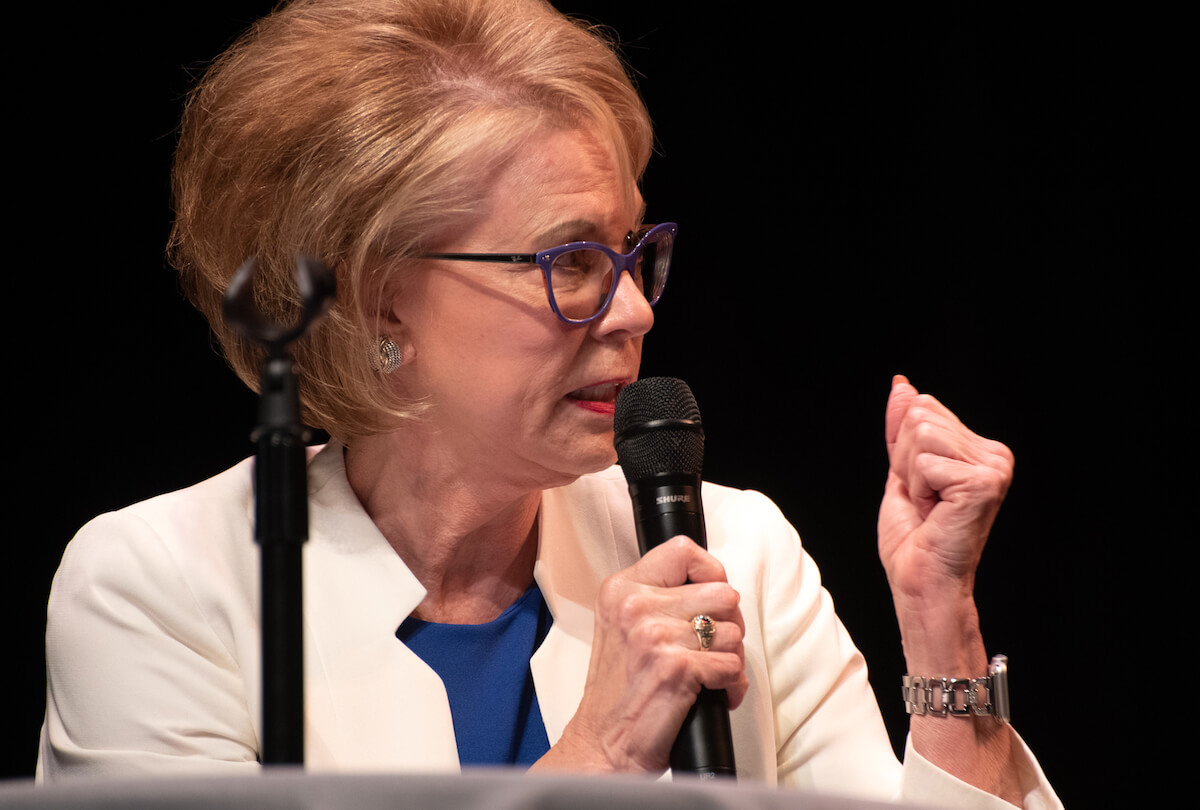
In cities across the country, activist groups have called for defunding police departments. The OKC City Council passed its FY 2021 police department budget in a 6-1 vote on June 16, with the meeting including a lengthy public comment session which primarily featured callers who were critical of the city’s policing. The next day, the Norman City Council adjusted funding for the Norman Police Department in an 11-hour meeting packed with protesters.
During Thursday night’s CD 5 debate, Oklahoma City businesswoman Terry Neese deviated from Hill and Bice and chose not to repeat the phrase. Instead, she offered perhaps the most hard-line stance of the candidates on stage. Neese referred to participants in the protests that began after the death of George Floyd as “domestic terrorists,” echoing rhetoric previously used by President Donald Trump when referencing the protests.
“Obviously we’re in a very difficult situation, but let me say this: We must restore law and order. We have descended into mob rule,” Neese said. “It’s an extreme disappointment when we see supposed leaders like (Speaker of the House) Nancy Pelosi and (U.S. Sen.) Mitt Romney locking arms and protesting with domestic terrorists in opposition to our law enforcement. It makes me sick.”
Like most of America’s major cities, Oklahoma City has seen both peaceful protests and demonstrations that featured destruction. OKC’s local Black Lives Matter leaders were quick to distance themselves from the unruly demonstrations that took place in early June, but concerns have been raised that “outside agitators” have attended Black Lives Matter protests to stir up violence in Oklahoma. At the June 1 rally in Oklahoma City, an apparent teenager set off a firework near where speakers were addressing the thousands of attendees. He jogged away through the crowd as supporters of the peaceful gathering chased after and heckled him.
When former State Superintendent of Public Instruction Janet Barresi and U.S. Navy veteran Miles Rahimi spoke about the Black Lives Matter movement, neither directly addressed law enforcement or the movement in their responses.
Barresi said she had worked with Black communities “across OKC” during her time in office to “provide options for their children” outside of public schools. Barresi was involved in founding two charter schools: Harding Charter Preparatory High School and Independence Charter Middle School.
“I have seen the looks on parents’ faces when they are caught in a failing school,” Barresi said. “When I was in office, I used to tell staff, ‘Remember, we are educating each individual child in this state because each of them have worth and value,’ and that’s the way I look at this. (…) For me, the way out of poverty and the way to opportunity is through a quality education, so we’ve been working to expand education choice.”
Rahimi stated only that his presence on the debate stage as a first-generation American was testament that “the American Dream is alive and well for anyone willing to do the work.”
Getting personal with it
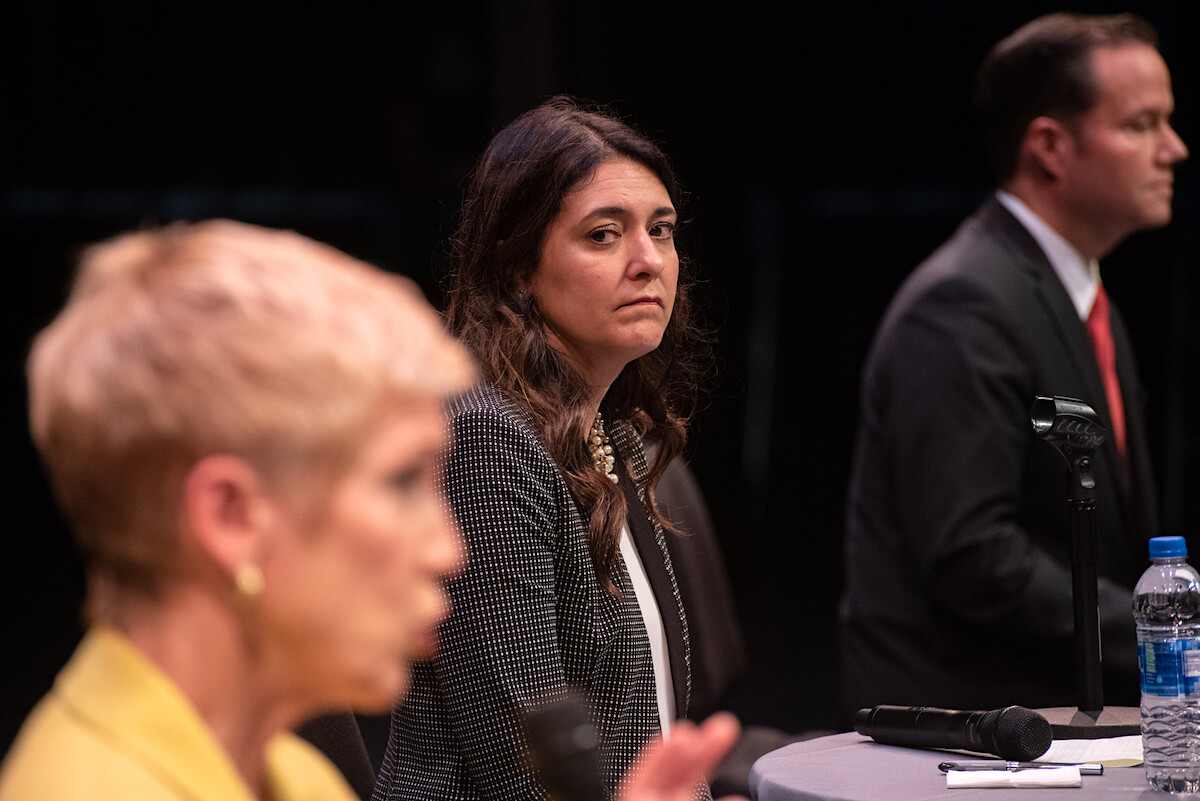
The CD 5 GOP primary debate’s final round of questions focused on each candidate’s individual history and the context of the race.
The first question of the round went to Bice, who was asked how she would explain her support of the largest tax increase in Oklahoma history to conservative voters who oppose raising taxes.
“I voted for the largest teacher pay raise in decades. I also protected Oklahoma taxpayers by refusing to increase property taxes, sales taxes or income tax,” Bice responded. “There are folks running for this seat who were firmly opposed and would have voted no on the tax bills that were put forth, but the reality is you have to make some tough decisions sometimes when you’re an elected official. I did what I felt was in the best interests of Oklahoma.”
Bice added that she supported the taxes that helped fund a substantial teacher pay raise because it was one of the best ways to ensure qualified teachers would want to stay in the state to teach.
The round’s second question was directed to Barresi, who was asked why GOP voters turned against in her 2014 state superintendent re-election campaign when she finished third in the Republican primary.
Barresi contended that her loss of support among voters was due to some feeling she did not do enough to oppose the Common Core education standards which were in place when she took office.
“When I came into office, the Common Core had already been adopted as a law in this state. As a member of the executive branch, I went about implementing the law because that’s what you do as a member of the executive branch,” Barresi said. “Three and a half years later, the public spoke again, and the Legislature repealed the law. I immediately pivoted and began to implement that law and to develop a new set of standards.”
Barresi, Rahimi critique Bice
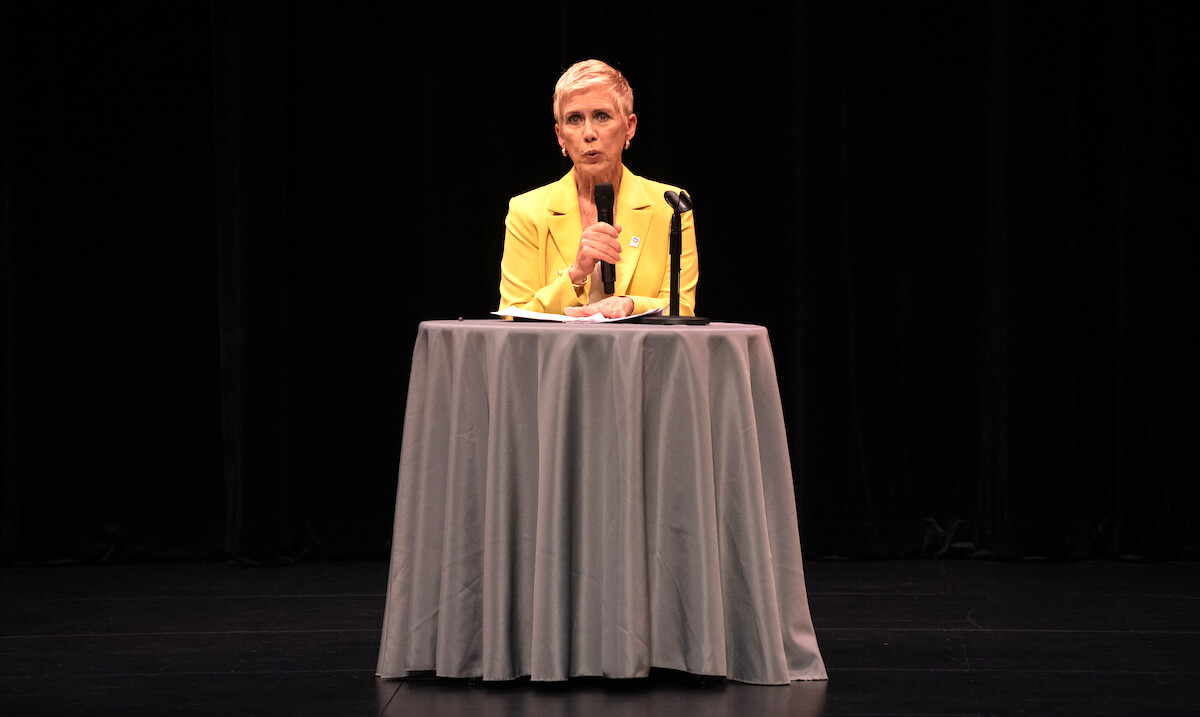
Barresi added that she was “appalled” at the tax increase that Bice supported in 2018.
“It’s very important to make sure that we appropriately reward our teachers, but I can tell you something that I was appalled at was the amount of this tax increase without any accountability for how the money is spent,” Barresi said. “That is something that I went after, I tried to implement more accountability, more transparency in the system. That was ignored, and that is something I very strongly objected to.”
Bice rejected Barresi’s claim that the 2018 bill lacked accountability, saying that “quite a few” safeguards were put in place, such as an adjustment of school districts’ minimum salary schedules, to ensure the funds were used as intended.
For his question, Rahimi was asked about the background of his legal dispute with the U.S. Navy, which lasted while he was still enlisted from 2015 to 2018. While Rahimi did not go into great detail, he said that he “rightfully stood up” for other sailors who “were being targeted on their race, religion and creed.” Rahimi was awarded a backdated promotion as a result of the case, he said.
If elected, Rahimi added that he would focus “very much so” on getting veterans mental health resources. Following his answer, Rahimi also used his time to challenge Bice, referencing an article by The Oklahoman’s Chris Casteel about mailers supporting Bice which claimed a 100 percent voting record for pro-life legislation. Rahimi said she had “mislead” voters.
“In fact, there were two bill that you voted against, and one of which would have restored religious liberties for adoption organizations,” Rahimi said. “We need to prosecute the case against Kendra Horn, and how are we going to expect you, State Sen. Bice, to do that if you’re willing to mislead (…) the voters?”
Bice retorted, stating she did not vote against the bills but was absent from the floor during the votes.
“I didn’t vote against those two pieces of legislation, I was actually absent. Every single bill that has been put forth that has been a pro-life initiative, I have a 100 percent voting record on,” Bice said. “As a member of the leadership team there are often times when I do miss a vote or two. It is not on purpose, but if I am pulled off of the floor and they are still doing floor work, unfortunately that does occur with every single member of the Legislature.”
The penultimate question was directed to Neese, who was nominated by President George W. Bush to become the director of the U.S. Mint in 2005. Neese announced she was withdrawing from consideration a day before the congressional confirmation hearing, citing concerns about being away from family in Oklahoma. Neese was asked what had changed since then to allow her to run for CD 5, which would see her spending much of her time in Washington.
“I came back to Oklahoma from the U.S. Mint — I actually worked there for a couple of weeks — I did that because my mother, who was in her 80s, had just moved to Oklahoma City, I had just moved her here. She was not doing well, and my heart jerked to come back to Oklahoma and take care of my mother,” Neese said. “Sometimes family has to intervene, and for me it was about my mom.”
Finally, Hill was asked to discuss his time as CEO of Kimray, Inc., and describe why he decided to ultimately leave his family’s company in 2013 after serving as CEO for four years.
“I’m really proud of my time at Kimray and the other companies I’ve been blessed to be able to lead and be a part of. I’ll go on to say that during my leadership there (…) we didn’t have any layoffs, even though we had several downturns,” Hill said. “I’d been there a long time, and I had another opportunity which was a fantastic opportunity. I took that opportunity, and I’ve gone on to do other things since then, and currently I’m out of the energy industry and into automotive manufacturing.”
The Congressional District 5 primary will take place on June 30, where each candidate will seek a majority of their party’s votes. If no candidate reaches that mark, a runoff will be held on August 25, and the nominee will challenge incumbent Congresswoman Kendra Horn (D-OK5) in the Nov. 3 general election.
NonDoc’s 2020 political debate series is sponsored by the Oklahoma Public School Resource Center, McSpadden, Milner & Robinson, and Fowler Auto Group.










